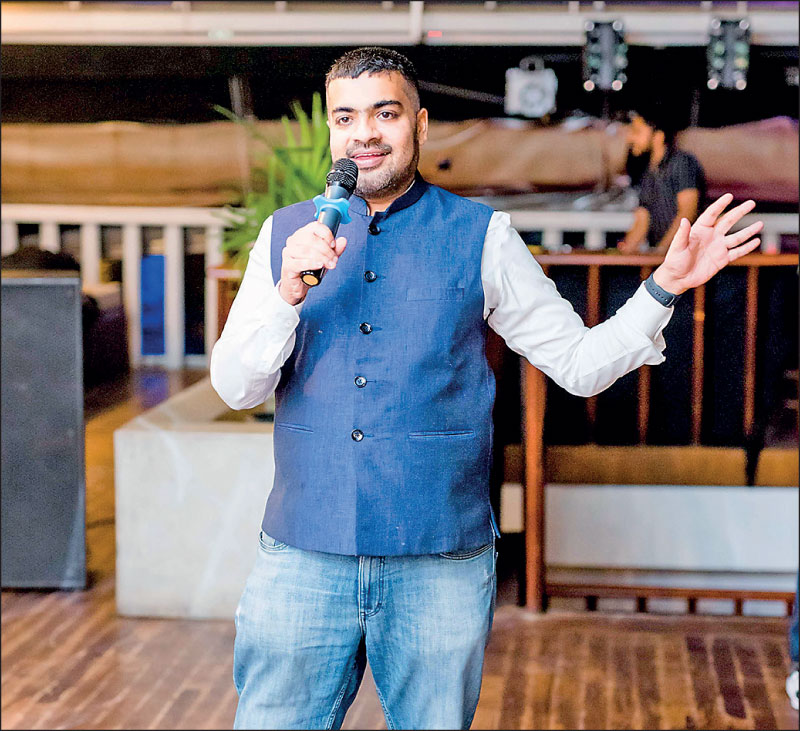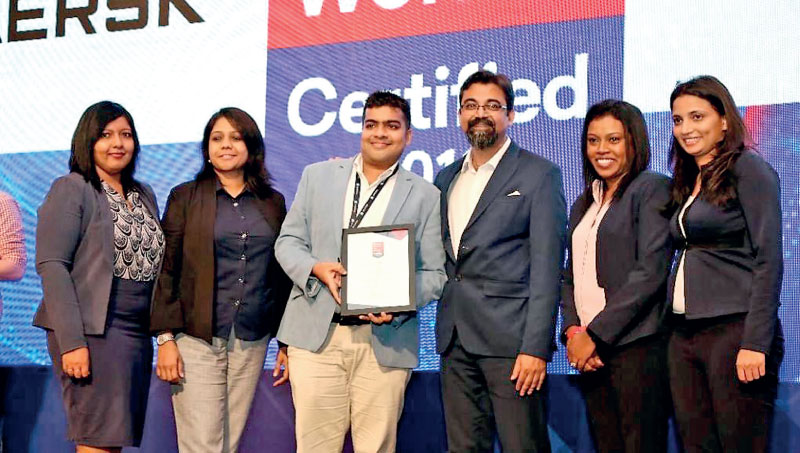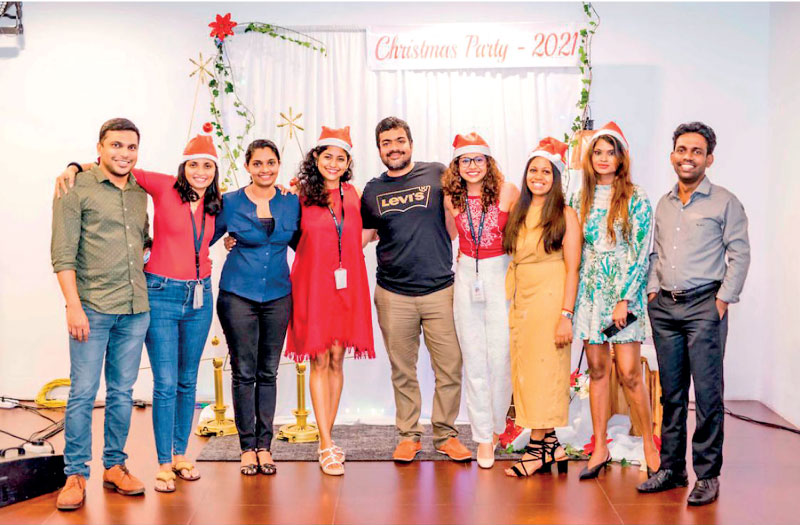Thursday Feb 19, 2026
Thursday Feb 19, 2026
Monday, 7 March 2022 01:15 - - {{hitsCtrl.values.hits}}

Siddarth Iyer
|
Picture a few sari-clad Bangladeshi ladies sitting on their mats and weaving, similarly let your mind skirt through Oxford Street, synonymous with London’s éclat for its high fashion and we at Maersk and the shipping faculty in its entirety can proudly say that, “We make things happen!” by ensuring that the items produced in one part of the world are taken to every corner of this vast globe, we call earth.
The imagery was so vivid as it takes us to the core of how supply chain providers are perceived. Its appeal has spanned millennia and those like Siddarth Iyer, Managing Director of Maersk Lanka, who joined the industry with no prior inclination of it but has grown into a stalwart within it and beyond, embraces the ever-changing facets of being in a dynamic industry that continues to grow from strength to strength, stealthily.
The Ceylon Association of Shipping Agents (CASA) was blessed to have caught up with him days before he bid adieu to Sri Lanka, and her people, the food and of course the dancing and songs he was endeared to for a span of over many years. Heading off on his new appointment to Singapore, Sid as he is called by his contemporaries and colleagues alike is all about facing life with aplomb and adapting to not merely stay in the game but succeed in all aspects of it. Here are excerpts.
|
|
Siddarth Iyer and wife
|
Q: As 2020’s most dominant player in the global shipping industry, what are the trends and strategic directions of Maersk for the foreseeable future?
Our transformation journey commenced in 2017 when we saw the need to move away from our traditional thinking of merely being an asset-based company, owning ocean and shipping assets viz. vessels and containers and a strong network, to move towards a customer-centric organisation built on an integrated vision with solutions for the customer’s needs.
While this initiative was initiated pre-COVID, it was accelerated during the onset of the pandemic. What this integrated strategy means is the democratisation of global logistics; similar to what Google or YouTube did with content and what Amazon does with the marketplace. Shipping and logistics are quite complex but what our customers require is to get their items from one place to another on strong tech platforms with multiple options. This led to the diversification from a geographical oriented outlook to a more vertical orientation of the business. It was no more about a one-size-fits all but a customised package which is more attractive to our existing clientele spanning the world.
Q: In terms of sustainability, what are the trends in the ocean freight industry?
Maersk has made a bold and brave decision to reach the goal of being carbon neutral by 2040. Even though the targeted year was 2050 initially, it was duly revised to 2040. Furthermore, it is not limited to a self-fulfilling policy as everyone has to share the same vision. Everyone realises that the planet is in dire straits and Maersk too wishes to adapt accordingly by strictly adhering to the policies under the Environment Sustainability Governance (ESG) which is an environment centred vertically. This endeavour is bound to pave the way to a more ethical and responsible shipping fraternity, reaching everyone in the supply chain. It is a paradigm shift in all operations from ordering ships with zero to minimal emanation of harmful pollutants, landslide products, logistics and services and more.
|
Q: Women empowerment and your findings during your leadership journey at Maersk Lanka?
I am fortunate to have and inherited a leadership team which was mostly women oriented. The gender parity has increased to almost 50%, which I believe is a significant diversity ratio and it is vital to me personally that we make our workplaces inclusive. I am proud to say that, I am surrounded by strong women in leadership roles from the Commercial Head, Customer Service Head, Financial Head among others. These are considered as eye openers to all from the veterans to the rookies irrespective that gender should not be considered a hurdle, instead embraced impartially for the furtherance of the industry, it is only then that we can thrive.
I have always been awed by the extreme levels of strength displayed by women, especially those who are constantly multi-tasking the roles of being a woman in leadership, caregivers and carers of parents, children, husbands, partners and more. After all, they ease into these avatars of themselves and succeed in each level. Maersk has identified the potential of women and systemised its policies, environment and the organisation accordingly; making it easy for women to thrive above and beyond its folds.
Q: In your view, what are the critical success factors for Sri Lanka’s maritime hub aspirations?
It is key that Sri Lanka develops in terms of capabilities with reference to hubs covering all levels from vessels to containers, docks and others. It has to contain a full-fledged and strategic approach, shifting its perceptions to a ‘tail that wags the dog,’ by enabling the transshipment capacity to fuel its growth potential and reach mercurial heights in all areas in the process. It is imperative that Sri Lanka positions itself as a strong contender or important node in an international supply chain network.
In order to do so, we need to take the story of our hub capabilities, which is one of the best guarded secrets in the world as what the general public are aware of are merely the transshipment capabilities. We need to improvise and offer exemplary services, world class infrastructure, ease of doing business in order to attract the investors. Surmise it say, it is pivotal and timely to extricate ourselves from the bubble mentality and geographical precedence, after all in a rapidly advancing world in which a click of button is all we need to obtain our requirements from any part of the universe, we need to think beyond the proverbial box and approach the industry with a fresh outlook which will inevitably ensure resounding success and carve an invaluable niche among the global shipping fraternity.
|
Q: In a footloose transshipment business, what should be the strategic priorities for the Port of Colombo to retain its position as a transshipment hub of the region?
Colombo needs to stay ahead of capacity as it is saturated with capacity, probably due to slow decision making. Hopefully that issue has been dealt with and new capacity is being added.
Today, in order to ensure reliability within the supply chains; we need to change the perspective of the customer in relation to ocean freight as most often than not a customer pays a king’s ransom for a paltry service and that requires a watershed. Ocean reliability is the lowest. For that perception to change, transhipment hubs play an important role as much criticism is directed towards them. My personal advice is to increase capacity and brand this as the Port of Colombo.
For instance, when networks are planned globally, each moment is crucial and taken into consideration and they expect it to work. Therefore, Sri Lanka needs to project itself in totality in the trade as the Port of Colombo and develop all aspects of being a hub. Sri Lanka. The region per se has sufficient growth in terms of volumes, thus a change in outlook is fundamental for growth.
Q: Capacity trap? Can it be a reality?
I wish to reiterate that capacity is merely one cog in the wheel and not the main prerequisite for success or failure. Sri Lanka should run the gauntlet of policy, framework, regularisation, ease-of-doing-business, vessel clearance and customise manual, digitise and capitalise on our location in a broader sense. All these should be consolidated to make it easy for customers.
Furthermore, Sri Lanka needs to create the infrastructure and attract international supply chain companies, more so due to their role as decision makers in the networking sphere. These companies are the ones who are networking with customers on a global level and that’s a great channel to tap in order to elevate Sri Lanka into hub status. Stop using capacity as a scapegoat and see it as merely a minor solution which has to be addressed in a bigger game.
Q: How was the experience of working in Sri Lanka and with Sri Lankans (talent pool, etc.)? Did you find it enjoyable or tough?
I love Sri Lanka – its hospitality and the camaraderie that exists among my Sri Lankan friends and colleagues. When I relocate to various parts of the world, I generally try and amalgamate and I like to think that I am ‘Sri Lankanised’ to a great extent since the commencement of my stint here; after all, I can sing the local songs, do the ‘old man dance by balancing the glass on the forehead and more (added he with a jest). Professionally and personally, my wife and I were blessed to be surrounded by an amazing team.
With reference to talent, it is exceptional among all strata of society and especially among the youth of Sri Lanka but it is essential that the youngsters are encouraged to be resilient, especially in the face of adversity, and not be tempted to seek temporary solutions. Challenge the status quo and move forward and upward.
Another important element I perceived during my tenure is Sri Lanka and what we at Maersk emphasised on is the importance of physical and mental health and the need to inculcate the benefits of financial health by promulgating a saving and investing culture. These aspects aside, Sri Lanka and her people have a special place in our hearts.
|
Q: What can Sri Lanka do to improve and promote more foreign businesses to invest/operate in Sri Lanka?
It requires the need or the profound or even desperate desire to adapt to the times by enabling international companies and potential investors an opportunity to exercise their expertise without marring their capabilities in trying to profit unscrupulously. Maersk per se is keen on investment opportunities that target but are not limited to building warehouses, logistics hub developments, coal chain establishment and expansion and more. Yet, making the vision a reality requires leniency in investor rules and consistent policy making.
Using the illustration of fishes in a bond, I would say, that it is better to be a small fish in a big pond as there is plenty for everyone to do, instead of being a big fish in a small pond as this will not flourish and while it may be beneficial for few big fish temporarily it is not sustainable. I believe that folks have realised this error, which has made the climb hard for the industry and the country as a whole but it is still never too late nor impossible. It requires widening the pond by changing the transhipment regulation framework; attracting international companies and an unbiased perspective and an undiminished hope that it will eventually get better.
|
Q: Why would maritime be a blue ocean of opportunities for young and aspiring professionals?
First and foremost, we should have a sense of focus in what we do; while in Bangladesh, I saw an image of Bangladeshi women working on a factory floor, similarly an image of a Burberry’s store in London … and it created a profound and powerful impact as I realised our role in this structure was significant as ‘we make things happen!’ We are the fulcrum in the totem pole enabling our clientele to obtain their requirements from all parts of the world.
That perception offered clarity about the importance of what we do and the term supply chain enablers struck a chord as it covers a plethora of avenues.
We emphasise too much in the term maritime which is relegated to shipping lines, agents and terminals, etc., but when we address it as supply chain enablers, it refers to the manufacturers, customers, eco systems and more. Amazon, for instance, has broadened its reach beyond a mere front-end portal by including planes and more modes of transport within their logistics framework.
When I joined Maersk 18 years ago, I was unaware of its in-depth nature but it has been beneficial and I believe that Sri Lanka being an island will always have plenty of opportunities in the field of maritime or better yet supply chain professionals in the maritime or seafaring industry, therefore it is essential that the youngsters are groomed and most importantly drawn to the sense of adventure and excitement that is part and parcel of this lucrative career path.
Q: What will bring you back to Sri Lanka, again?
The food (without hesitation), the easy access to pristine beaches, fauna and flora, cool climes and majestic mountains and the phenomenal nineties party consisting of songs of my favourite era in music and finally and most importantly the people.
Q: How did you foray into the field?
It was through a friend who was following a management training program at Maersk in 2004. He recounted his experience, especially the fact that he was sent for training at Copenhagen and that sparked an interest which persuaded me to apply for the job and within a week I was an employee of the prestigious shipping magnate and have never looked back. It has been almost 18 years of fulfilment since my foray into the industry.
|
Q: What is Maersk’s role in Sri Lanka?
The Danish company with a history spanning a century, commenced operations as a steamer container company and it has developed rapidly into the largest container shipping line offering innovative solutions to its ever-expanding global clientele. Maersk established itself in Sri Lanka 28 years ago and continues to grow stealthily and retain its number one position as a colossal supply chain enabler. While our focus is global, we continue to encourage customers to utilise Sri Lanka and offer a host of comprehensive albeit integrated services in Sri Lanka.
Q: What are some countries you’ve been to during your professional postings and where would you consider your favourite?
I have been to Bangladesh, Belgium, India and more on work. While Belgium was my first posting as a 24-year-old and I consider it a thrilling experience, I consider my stint in Sri Lanka to be the very best, mostly due to the professional and personal rapports built. It is also where the business, I spearheaded with the unstinted support of my team reached unprecedented heights in terms of profit, creating a sense of undiminished pride in our achievements which was a result of dedication and commitment to reaching our goals and for that reason among others, I consider Sri Lanka as my most favoured destination by far.
|

Siddarth Iyer with some of the staff of Maersk Lanka at the Great Place to Work Awards

Siddarth Iyer with some of the staff members of Maersk Lanka